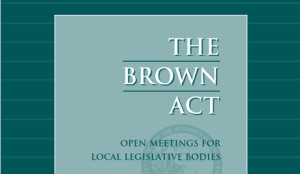Good News: Technical Difficulties Are Not Brown Act Violations
According to the Ralph M. Brown Act, a City is responsible for posting an official meeting agenda on its website (assuming it has one) at least 72 hours before the scheduled meeting takes place. The Brown Act’s purpose is to ensure the deliberations and actions of a public legislative body are open to the public. Brown Act violations, even unintentional, can quickly lead to public scrutiny and inquiries from a growing number of advocacy organizations that are just waiting to pounce on any opportunity to promote transparency in government.
Given our steady stream of technological advances (and the related “mo’ tech, mo’ problems” issue), there can be some gray areas in this California Government Code. What if, through no fault of your own, your City website goes down during that 72-hour period before your meeting? Can an untimely server error open you up to negative press and verbal abuse from your community and the local press?
Now, we have a solid answer to that question: as long as a City “has otherwise substantially complied with agenda-posting requirements,” the meeting can move forward as scheduled. The ruling from the Attorney General and Deputy Attorney General thankfully appeals to common sense. After all, cities should not be penalized for having an online presence and it could be a logistical nightmare to reschedule meetings if the website has any downtime in the days leading up to a public meeting.
Excerpt of the Opinion:
“We are confident that fleeting or trivial technical issues will not typically require the cancellation of meetings….we conclude that, where technical difficulties prevent a local agency’s legislative body from posting the regular meeting agenda on the local agency’s website for a continuous 72-hour period before the scheduled regular meeting, but the legislative body has otherwise substantially complied with the Brown Act’s agenda-posting requirements, the legislative body may lawfully hold its regular meeting as scheduled.”


